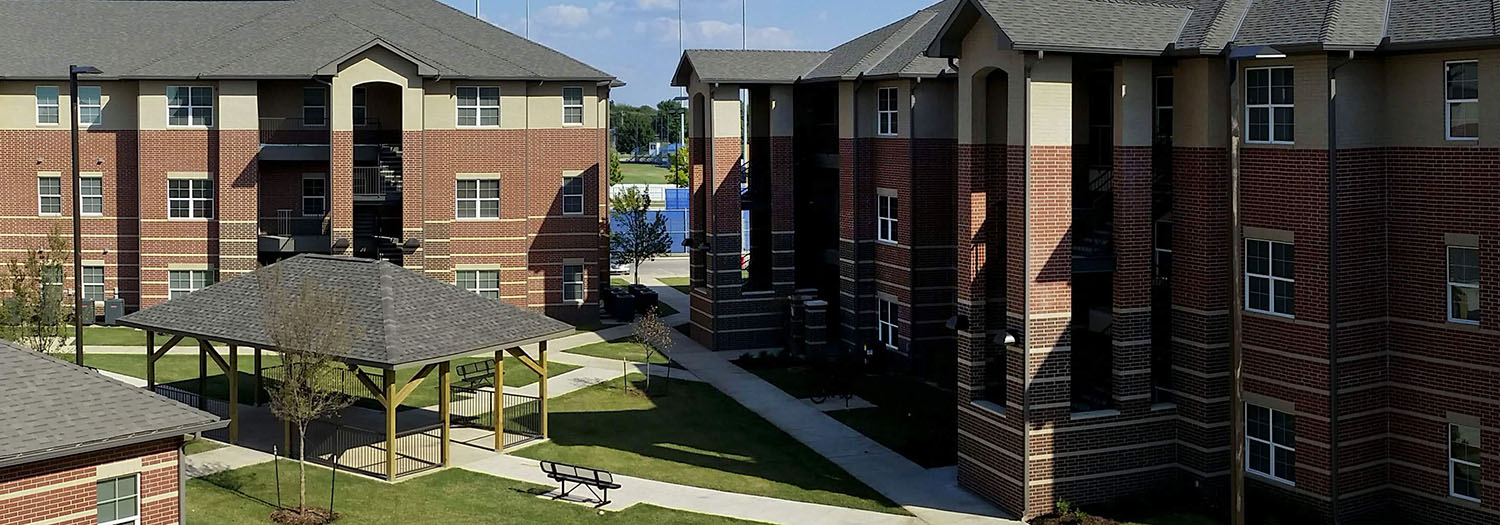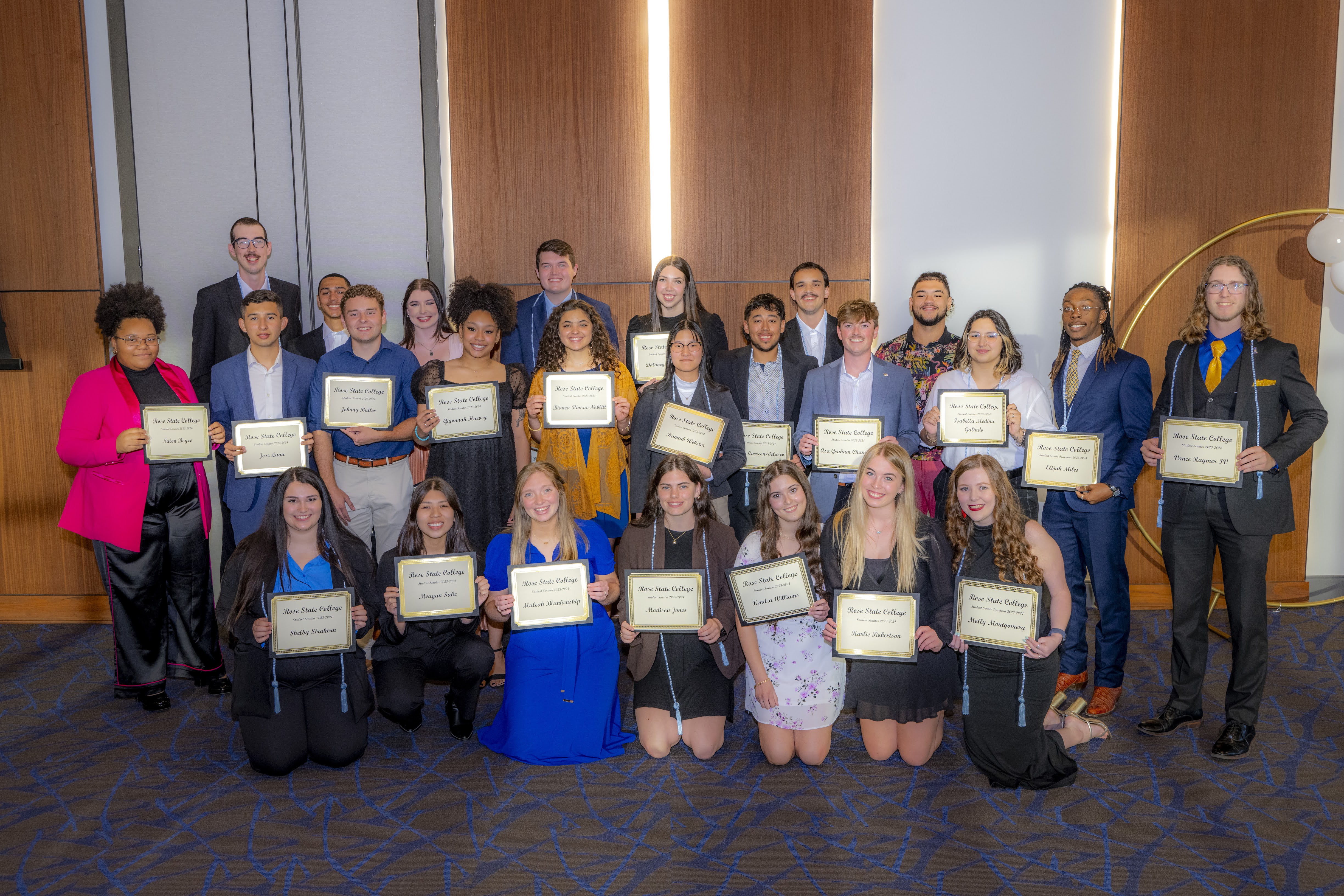Emotional Support Animals
Rose State College Emotional Support Animal Housing Policy
Overview
An Emotional Support Animal (ESA) is an animal that provides emotional support which alleviates one or more identified symptoms or effects of an individual’s disability. The College (RSC) recognizes the importance of allowing reasonable accommodations, including approved Emotional Support Animals, necessary to provide individuals with disabilities an equal opportunity to use and enjoy College housing. Unlike a service animal, an Emotional Support Animal does not perform a task for a person with a disability relating to activities of daily living or accompany that person at all times.
Title XII Public Safety & Welfare Section 167-D:8 II.
It is unlawful for any person to fit an animal with a collar, leash, vest, sign, or harness of the type which represents that the animal is a service animal, or service animal tag issued under RSA 466:8 or to request a service animal tag issued under RSA 466:8 if in fact said animal is not a service animal.
An Emotional Support Animal does not necessarily need to be trained, and is not limited to any specific type of animal. An ESA is subject to restriction from any area with a no-pet policy. An individual with a disability may request a reasonable accommodation for an Emotional Support Animal in RSC housing if the individual can establish that the ESA is necessary to afford him/her an equal opportunity to use and enjoy RSC housing, and the presence of the ESA in RSC housing is reasonable.
Requesting Authorization to Have an Emotional Support Animal at Rose State College
All requests to have an Emotional Support Animal in Rose State campus housing must be made through Student Access Services (SAS). The student must contact SAS before bringing the Emotional Support Animal to campus and follow the process of registration. For more information on how to register for
accommodations and services, visit the Student Access Services (SAS) website. Please note: Requests of this nature will be processed as quickly as possible allowing for contact with the student and possible follow-up with a 3rd party regarding documentation. No ESA may be brought into RSC housing until a decision is made on the ESA request.
When submitting supporting documentation, ensure that the documents establish the existence of a disability and a relationship between the disability and the accommodation request (i.e. an Emotional Support Animal). Having a psychological/emotional disability does not necessarily qualify an individual
to have an Emotional Support Animal in RSC housing as an accommodation. The student must establish that the animal provides emotional support or other assistance that would ameliorate one or more symptoms or effects of the disability.
Reasonableness Guidelines
The College, in consultation with the student and other parties, as appropriate, may consider the criteria below in determining whether the presence of the ESA is reasonable in making housing assignments for students:
- Whether the animal poses (or has posed in the past) a direct threat to the individual or others;
- Whether the animal causes (or has caused) excessive damage to housing beyond reasonable wear and tear;
- Whether the size of the animal is too large for available assigned housing space;
- Whether the animal’s presence would force another individual from assigned housing (e.g. serious allergies);
- Whether the animal’s presence violates other residents’ right to peace and quiet enjoyment;
- Whether the animal is housebroken or is unable to live with others in a reasonable manner.
If a request has been granted for an emotional support animal, the approval is applicable only for that specific animal and housing assignment. Requests for another animal or subsequent housing assignments must follow the same procedures, as outlined in this policy, and will be determined following the same guidelines.
Conflicting Disability Accommodations
Housing will work to address any conflicts related to an ESA and assigned housing prior to and/or during the academic term. Students should contact SAS if they have a medical condition(s), or chronic illness(es), and are concerned that exposure to an Emotional Support Animal will result in a health or safety related concern. RSC employees should contact the Affirmative Action Office; 405.733.7979. If not already registered with SAS for that condition, the student with the concern will be asked to provide medical documentation that illustrates the condition(s). SAS will conduct an evaluation process and determine if the condition is disabling and if there is a need for an accommodation. If a need for an accommodation is determined, SAS will define the appropriate accommodation and coordinate with Housing as to reasonable options.
Owner’s Responsibilities for an Emotional Support Animal
Students granted the accommodation of an ESA in RSC housing are subject to the following rules and expectations, in addition to any other College rules and regulations.
- The animal must be under the student’s control at all times, meaning it may not be able to freely interact with others or wander around. “In control” is defined as harnessed, tethered, on a short leash, or held by the student. If an animal exhibits behavior that poses a health or safety risk to others or if the animal cannot be controlled (e.g., destruction of College or personal property, exhibiting aggressive behavior), the Handler must take effective action to correct the behavior.
- The handler must maintain the Emotional Support Animal in their assigned room. The animal is not allowed in other students’ rooms/apartments, common areas such as lounges/kitchens, or laundry facilities, or other college buildings or facilities.
- When the Handler is not present the animal should be housed and secured in the Handler’s room in an appropriately sized kennel or container.
- Assistance animals need to be removed from Housing during breaks and residence hall closures. In general, when the student is gone for an extended period of time the animal should be gone as well. The animal may not remain in the community to be “cared for” by others while the student leaves for extended periods of time – defined by more than 6 hours or overnight. Student may not substitute one assistance animal for another unless approved by SAS.
- Sensitivity to residents with allergies and to those who fear animals is important to ensure the peace of the residential community. Therefore, the student is responsible for ensuring that the animal does not unduly interfere with the routine activities of the residence or cause difficulties for students who reside there.
- The student is responsible for any damage(s) caused by the animal, including costs associated with replacements and repairs that exceed typical wear. Animal waste must be properly disposed of outside of the building. Student must provide own cleaning and waste bagging materials. All personal items must be kept in the student’s private room/apartment. Common areas of the building cannot store items such as cages, food, bedding, or anything else.
- The student is responsible for the care and supervision of the animal, which includes toileting, grooming, feeding, and veterinary care. This includes abiding by any applicable local or state ordinance, law or regulation pertaining to licensing, vaccination, and other requirements for animals residing in housing. Students whose assistance animals are either a dog or cat will be specifically required to submit licensing and rabies vaccination paperwork to Rose State Housing prior to the animal being permitted in the residential building.
- The ESA must be maintained and in good health (kept clean, free from fleas or ticks, free of illness, crated when left in the residential room alone, etc.).
- The animal will be held to the same behavioral standards as residents (i.e., noise, disruption, destruction). The student will be held responsible for the animal’s behavior and subsequent consequences as outlined in the Rose State conduct process. Multiple infractions, or a serious singular infraction, may result in removal of animal from housing at Housing’s discretion.
- To the greatest extent possible, the assistance animal should not make unsolicited contact with others or their personal belongings. To that end, the student should request that others avoid petting or addressing the assistance animal, feeding the animal, or attempting to separate the owner from the animal.
- Assistance animals should not be disruptive, aggressive, or out of the owner’s control; and should avoid blocking aisles or passageways for fire/emergency egress.
- Per the ESA policy, Housing reserve the right to disclose to others impacted by the presence of an assistance animal (including potential and/or actual roommate(s)/neighbor(s)/RSC staff) that the animal is permitted in housing. Direct roommates/suitemates/apartment-mates must give explicit consent to share living space with an assistance animal. Should any person directly impacted by the presence of an assistance animal revoke consent and/or express undue hardship which could be relieved by the removal of the animal, Housing may remove the animal until a housing reassignment solution for one or multiple parties can be arranged.
- The student must notify Residence Life and Disability Services in writing if the animal is no longer needed as an Emotional Support Animal or is no longer in residence. To replace one animal with a different animal, the student must file a new request with SAS.
The student is responsible for any damage caused by the Emotional Support Animal to College property or to the property of others. The College has the right to bill the student’s account for any unmet obligations.
The student should request that others avoid petting or addressing his/her Emotional Support Animal,
feeding the ESA, deliberately startling the ESA, or separating or attempting to separate the student from
the ESA. To the greatest extent possible, the animal should not:
- Make contact with others or their personal belongings;
- Display any behaviors or noises that are disruptive or aggressive to others; and
- Block an aisle or passageway for fire and/or emergency egress.
Animals may be removed from any campus facility for the following reasons:
- Out-of-control Behavior: A Handler may be directed to remove an animal that poses a health or safety risk to others or that cannot be controlled (e.g., destruction of College or personal property, exhibiting aggressive behavior). Repeated instances of such behavior may result in exclusion from College facilities until the handler can demonstrate that they can effectively control the animal.
- Not Housebroken: Animals must be housebroken.
- Should the animal be removed from the premises for any reason, the student is expected to fulfill her/his housing obligations for the remainder of the housing contract.
- Residence Life has the authority to relocate a student and the support animal as necessary per current contractual agreements.
- These policies and responsibilities are specific to assistance animals within the residential buildings. Student is also responsible for understanding and abiding by the policies related to academic buildings and other campus buildings with regard to assistance animals.
- The expectations and responsibilities are understood and agreed upon, per the signatures below, for the duration of residing in Rose State College Housing.
- The owner does not comply with the Owner’s Responsibilities set forth above; or the animal or its presence creates an unreasonable disturbance or interference with the College community.
Any incidents must be immediately reported to the Coordinator of SAS, who will consult with RSC Housing staff, the ESA owner, and other parties as appropriate and render a decision on a case-by-case basis. After an animal has been removed from RSC housing, the student must submit a new request
through SAS to have an ESA in College housing. Animals that are ill or in poor health should not be taken into common areas within RSC Housing or out in public. Additionally, an animal displaying poor hygiene or consistent ill health may be asked to leave campus until the situation can be remedied.
In order to request that the Emotional Support Animal can return to campus:
- Submit a letter to the Coordinator of SAS clearly illustrating the readiness of the animal to return.
- Indicate how the behavior was extinguished and what is being done to ensure continuing
- appropriate behavior if able to return.
- Meet with the Coordinator of SAS.
- The Coordinator of SAS will conduct an evaluation process in order to make a final
- RSC Housing will be consulted, along with any other necessary parties.
Acknowledgement & Release of Information
As part of the accommodation request for an ESA, the student gives permission to Student Access Services (SAS) and Rose State College Housing to disclose to others impacted by the presence of the Assistance Animal (e.g., Housing staff, potential and/or actual roommate(s)/neighbor(s)) regarding the
presence of an animal as an accommodation. The student understands that this information will be shared with the intent of preparing for the presence of an Assistance Animal and/or resolving any potential issues associated with the presence of the Assistance Animal.
Emergency Situations
Animals can become disoriented and confused from the smell of smoke, fire or from sirens. College personnel and first responders are not responsible for removing an ESA during emergency evacuation for events such as a fire alarm and may not be held responsible for the care, damage to, or loss of the animal.
Keep in mind the first priority of emergency personnel is the student and there may be situations that may necessitate leaving the animal behind in an emergency situation.
Rose State College Grievance Procedure
Rose State College is committed to providing appropriate accommodations and services to qualifying individuals with disabilities under Section 504 of the Rehabilitation Act of 1973 and the Americans with Disabilities Act of 1990 including changes made by the ADA Amendments Act of 2008. Contact the
Associate VP, Student Life (405.733.7387) or the Affirmative Action Office , ADA Compliance (405.733.7979 or 711 TTY) if you believe your rights have been violated or you are dissatisfied with a decision concerning an Emotional Support Animal.
Resources:
Americans with Disabilities Act http://www.ada.gov/regs2010/titleIII_2010/titleIII_2010_withbold.htm
Fair Housing Act http://portal.hud.gov/hudportal/HUD?src=/program_offices/fair_housing_equal_opp/progdesc/title8 https://portal.hud.gov/hudportal/documents/huddoc?id=servanimals_ntcfheo2013-01.pdf




